Hey there. Let’s talk about the shift in digital marketing. Tools like Profound can show where your brand pops up in AI search results, but they might not give you everything needed to become the go-to authority for AI engines.
If you’re a marketing leader, you likely want more than just reports. You need a solution that creates, optimizes, and publishes top-notch content to stand out on platforms like ChatGPT, Gemini, and Perplexity.
In this breakdown, I’ll walk you through why monitoring alone isn’t enough in today’s AI-driven search world.
We’ll also look at alternatives that offer complete content creation systems to boost your strategy and keep up with the daily demands of AI search optimization.
Why Monitoring Isn’t Enough in the AI Search World
AI Search Is About Authority, Not Just Keywords
The way businesses connect with customers online has changed. It used to be all about keywords and backlinks for search rankings. Now, it’s about being recognized as a trusted source by Large Language Models, or LLMs.
When someone asks ChatGPT for recommendations in your field, your company needs to be the one mentioned.
AI search engines don’t just list websites. They pull together information to answer questions directly. Your content has to be more than visible; it must carry enough weight to be referenced as a key resource.
Moving from getting clicks to earning mentions is a big shift in how you build your content plan.
Where Pure Monitoring Tools Fall Short
Monitoring tools like Profound can tell you how often your brand shows up in AI search results. However, they often focus on data and reports without offering built-in ways to take action on those findings. This creates a gap when you need to move quickly to improve your position.
Speed matters in AI search success. These tools might highlight that competitors are getting more mentions, but without direct tools to fix this, you’re left piecing together solutions from elsewhere.
Daily Content Is the New Standard
Information moves fast today. Much like social media, if you’re not sharing valuable content every day, you’re losing ground. AI systems value fresh, detailed, and regular updates. A couple of blog posts a month won’t keep you relevant in AI search results.
As AI generates more content daily, your online presence can shrink if you’re not active. A steady stream of strong content is essential to stay visible to AI indexing systems. If you don’t shape your image with quality material, your competitors will shape it for you.
What to Look for in an AI SEO Content Platform
Complete Content Creation Tools
A good AI SEO platform should cover every step of content production, from planning and research to drafting, verifying facts, and optimizing for search. It needs to grasp your business context, match your brand tone, and create content that AI systems will trust and reference. Basic AI tools with generic outputs won’t build the credibility you need.
Technical SEO Tailored for AI Systems
Old-school SEO was about keywords and descriptions. For AI search, you need advanced setups like schema markup, LLM.txt files, and Model Context Protocol setups. These elements help AI engines better interpret and reference your content.
Your platform should handle these technical details automatically, without your team needing to step in. This means proper metadata, structured data, and specific files that signal your content’s value and relevance to AI systems.
Easy Publishing and System Integration
Creating content without a way to publish it adds extra steps. A great solution connects directly to your current systems or offers a hosted option that aligns with your brand. It should keep visuals consistent, manage technical setups like subdomains, and ensure content boosts your main website’s strength instead of spreading it thin across platforms.
Support for Multiple Brands or Large Teams
If you manage several product lines or companies, handling separate content strategies from one dashboard is key. The right platform lets you run different campaigns while keeping each brand’s voice, keywords, and posting schedules distinct. This helps your team grow its impact without adding more work.
Live Tracking and Strategy Adjustments
While standalone monitoring tools aren’t enough, a full AI SEO platform must include detailed performance tracking. It should give real-time updates on how your content performs across AI search engines, track how often you’re mentioned, and suggest ways to improve. This ongoing feedback loop sharpens your approach over time.
Want to take control of AI search results? Schedule a demo with AI Growth Agent to see an autonomous platform in action.
Breaking Down Alternatives to Profound for AI SEO
Option 1: Combined Content and SEO Tools like SurferSEO
These platforms go beyond basic monitoring by blending content creation with optimization features. They offer solid content planning, some automation, and tools like live content scoring. This can work well for steady content needs.
However, they often need a lot of manual input and aren’t fully hands-off. Many lack AI-specific technical features like LLM.txt files or protocol setups. Without heavy editing, content quality can vary.
Option 2: Basic AI Writing Tools
This group includes simple AI writing aids and prompt-based apps that churn out content from basic inputs. They’re tempting for quick, cheap drafts and suit small-scale projects or businesses just starting with AI content.
The downside is that they lack depth and don’t adapt to your business needs. Outputs can feel repetitive, miss unique angles, and ignore technical SEO needs. You’re left handling strategy, edits, formatting, and posting, and the content often fails to build trust with AI systems or search engines.
Option 3: Full Autonomous Platform with AI Growth Agent
AI Growth Agent takes a different path. It’s built for complete, hands-off content creation, optimization, and publishing to lead in AI search results. Instead of managing every step, it works independently while keeping you in control.
Key strengths include agents that manage research, writing, technical SEO, and publishing on their own. It uses advanced LLM.txt setups and a unique blog protocol for direct AI communication.
You get fast content creation tied to market trends, custom data use, smart image placement, and detailed tracking with visual performance maps across major AI systems.
This platform acts as your solution, not just a pointer to problems. It cuts a month of agency work down to minutes while keeping quality high. For managing multiple brands, its ability to run separate strategies from one hub offers unmatched efficiency.
On the flip side, AI Growth Agent works best for brands with a strong SEO base. It’s selective, targeting companies ready to scale, not those needing basic SEO fixes.
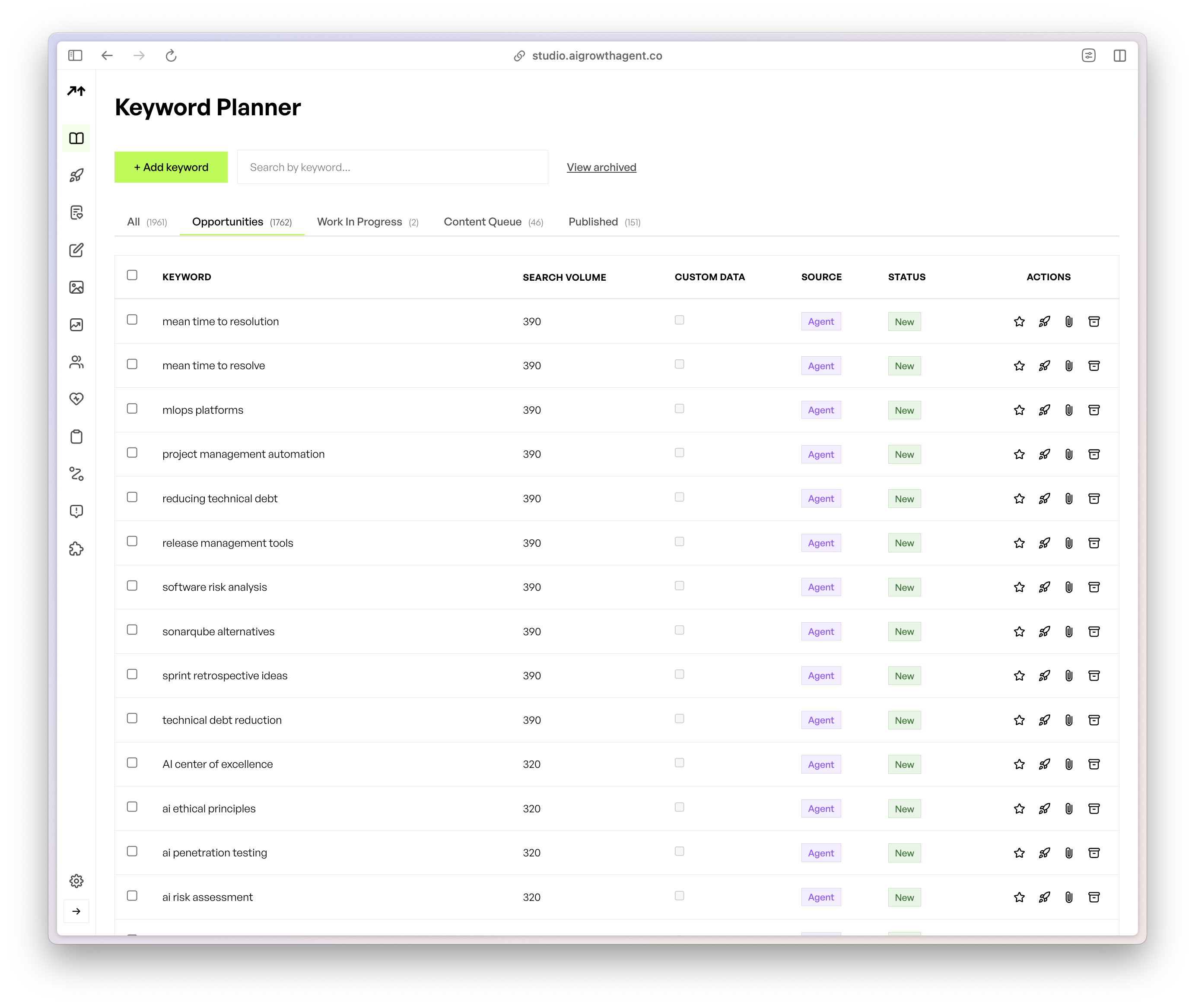
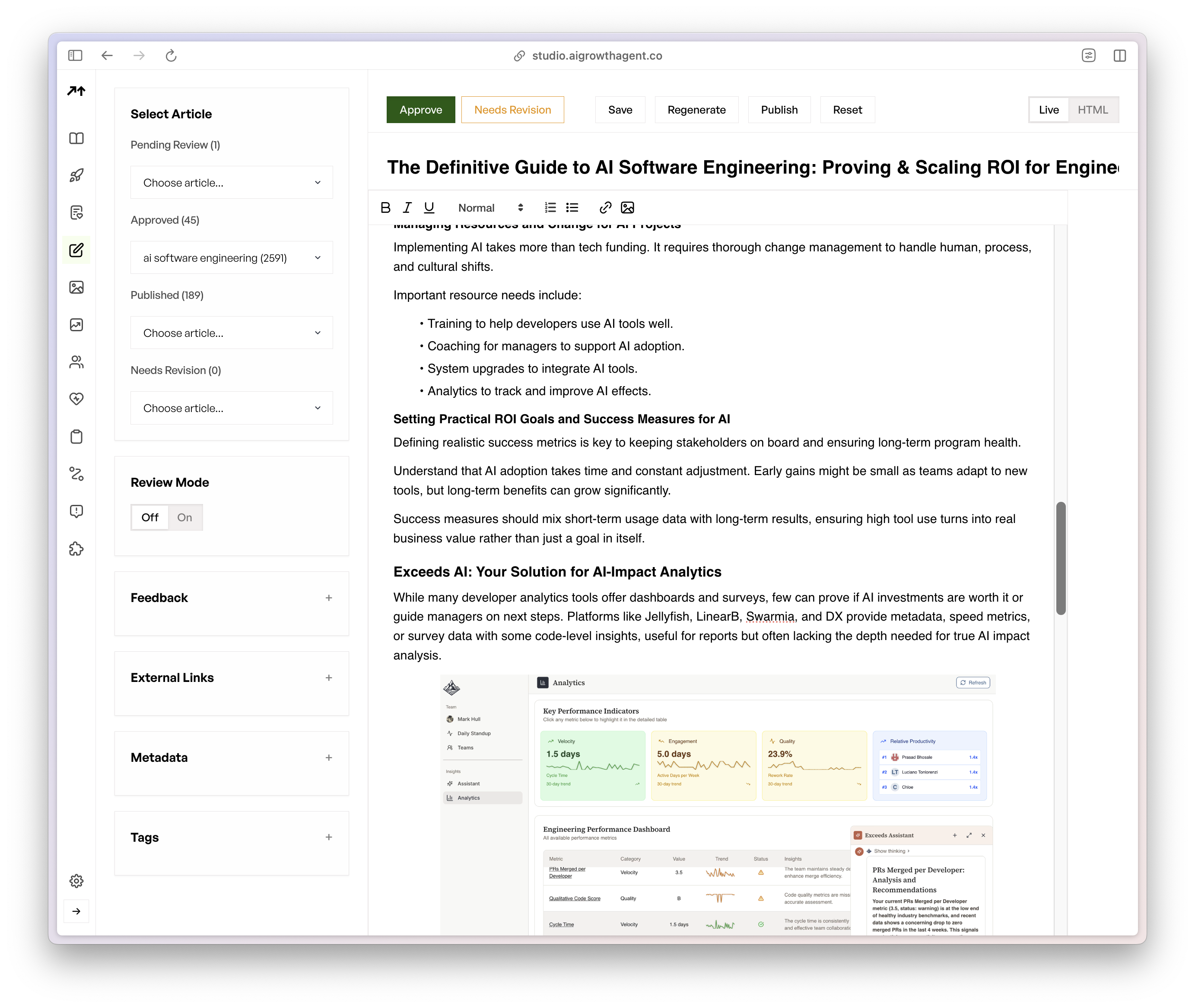
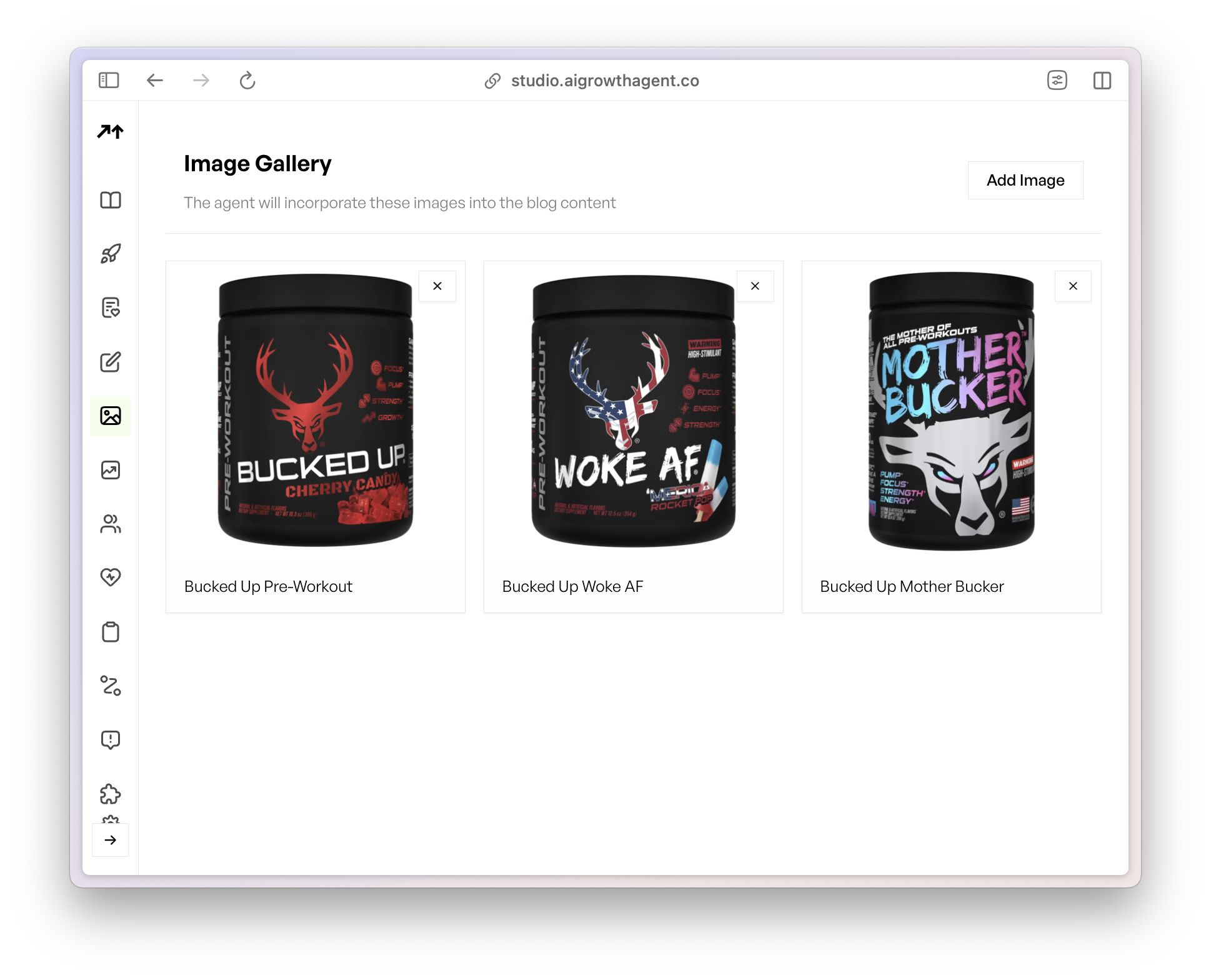
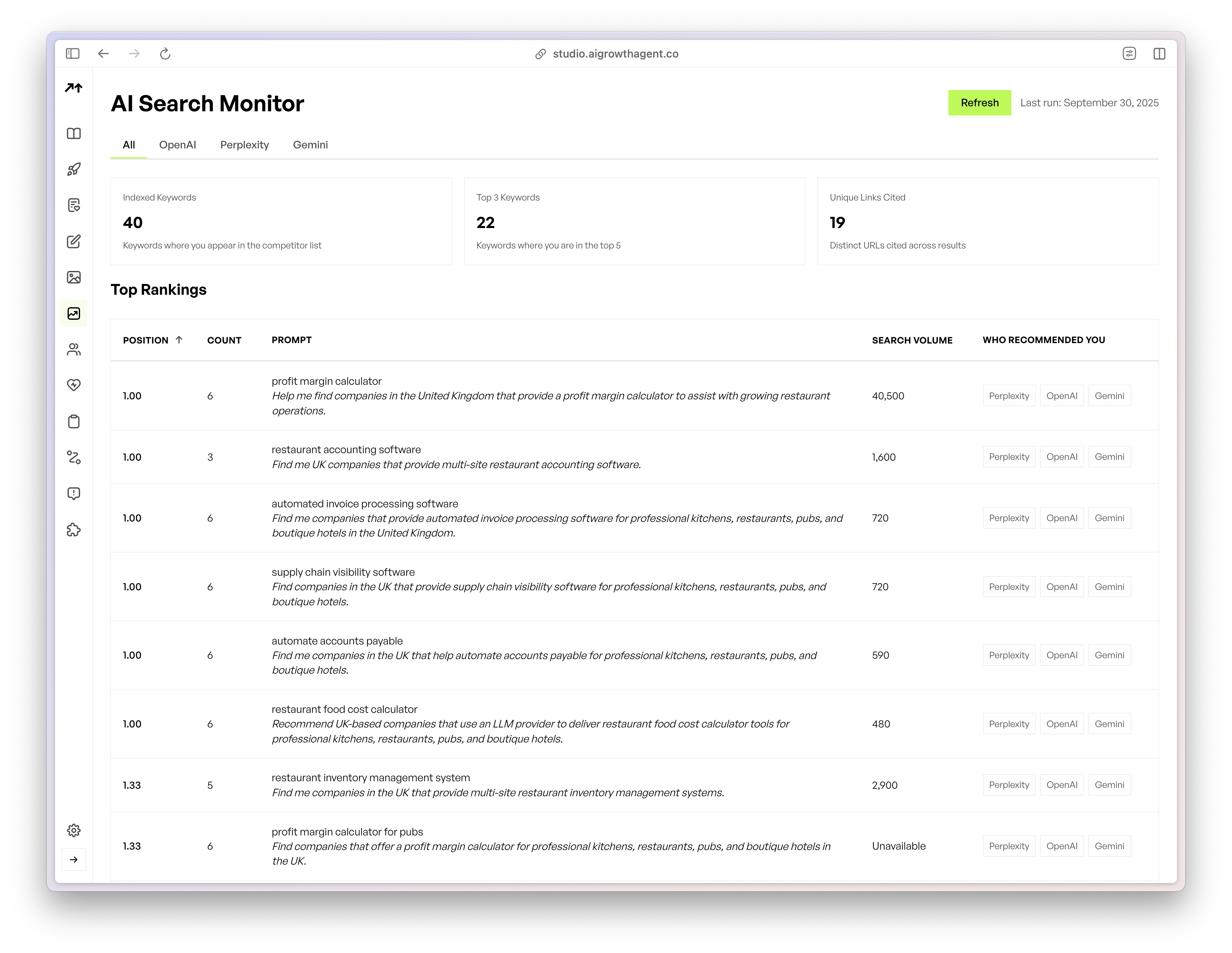
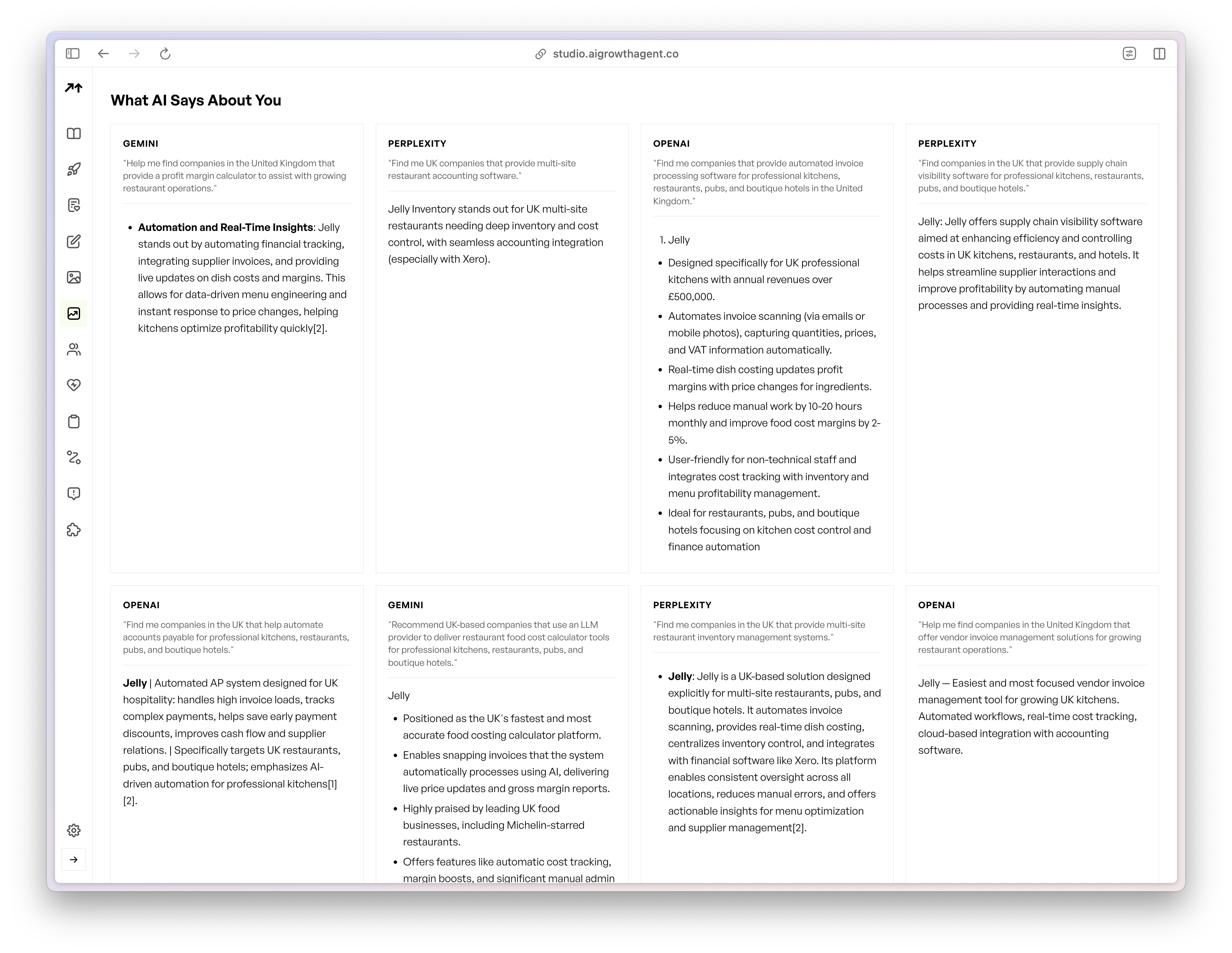
Quick Comparison: Profound vs. Other AI SEO Options
|
Feature/Capability |
Profound (Monitoring) |
Integrated Platforms |
AI Growth Agent |
|
AI Search Monitoring |
Yes |
Limited/No |
Yes (Detailed Visual Maps) |
|
Hands-Off Content Creation |
No |
Partial (Needs Manual Work) |
Yes (Covers Full Process) |
|
Advanced AI Technical Setup |
No |
No |
Yes (LLM.txt, MCP) |
|
Direct Publishing to Systems |
No |
Limited (Export Options) |
Yes (Fully Automated) |
How Autonomous Content Boosts Your AI Search Results
Owning a Niche with Daily Updates
Picture a B2B SaaS company in project management, up against big names. Monitoring tools might reveal they’re rarely mentioned in AI search, but offer no fix.
A system like AI Growth Agent can post daily, high-value articles on everything from practical tips to big-picture ideas, positioning the company as a trusted resource for AI engines.
Managing Content for Multiple Brands
A private equity firm with several companies under its wing often struggles to build authority for each without huge teams. Older solutions mean juggling agencies or overloading staff.
A platform like AI Growth Agent, with its ability to handle separate strategies, lets one team oversee unique content plans for each brand, with tailored voices and schedules, all from a single hub.
Responding to Trends Right Away
When news or industry shifts spark new search interest, traditional methods can’t keep up. By the time the content is ready, the opportunity is gone.
Platforms like AI Growth Agent can whip up relevant, on-brand pieces in minutes. After a major update in your field, it can deliver insightful content, capturing attention before competitors move.
Curious how AI Growth Agent can strengthen your brand in AI search? Schedule a demo now.
Looking at Overall Value Beyond Features
When comparing options to monitoring tools like Profound, think about the wider impact on your operations. Setup difficulty varies a lot. Simple AI tools need constant oversight, while fully autonomous systems cut down workload after the initial setup. Factor in hidden costs like reviewing, editing, and publishing when weighing total expenses.
Also, consider long-term growth. As your content needs increase, will the platform keep up without extra manual effort?
With the fast-changing competitive field, adaptability matters. Platforms that update for new AI search engines, tweak technical standards, and adjust to changes offer more lasting value than those needing constant manual fixes.
How to Pick the Right AI SEO Solution for You
Your choice should match your team’s skills and growth goals. If you’ve got solid content know-how and just need a slight boost, combined tools might work. But if you’re aiming for major growth in scale and quality, a hands-off system is likely the better fit.
Think about your market standing and urgency. If competitors are aggressive or you’re breaking into new areas, the speed of an autonomous platform could be critical. If you’re already well-positioned, a simpler tool might maintain your edge.
Assess your team’s bandwidth for content tasks. If they’re already maxed out, a solution needing heavy involvement probably won’t deliver the results you hope for, no matter its potential.
AI has endless questions, and AI Growth Agent makes sure your company gives the best answers. Book a demo today to optimize your content for AI search and lead in your field.
Common Questions About AI SEO Options
Do I Still Need an SEO Agency with an Autonomous Platform?
Platforms like AI Growth Agent take over the role of traditional content agencies by managing daily creation, optimization, and posting. That said, they work best with a strong SEO base already in place. They’re built to accelerate brands with solid setups, not to patch up basic SEO issues. You might still need SEO help for website tech tweaks, but content workload shifts to the platform.
How Does AI Growth Agent Keep Content Quality and Brand Tone Consistent?
Quality and tone are locked in through an in-depth onboarding process that builds a detailed Company Manifesto. This captures your positioning, story, and voice as the guide for all AI actions. You stay in charge via AI Growth Agent Studio, reviewing and approving content before it goes live. The system learns from your input, getting better until you’re comfortable letting it publish on its own.
How Soon Can I See Results from an Autonomous Content Plan?
Results depend on your starting point and competition, but autonomous systems often deliver faster outcomes due to quick publishing and technical setups. With AI Search Monitor, you get live updates on your visibility across key AI platforms, so you track progress as it unfolds instead of waiting for periodic reports.
What’s the Difference Between Monitoring Tools and Full Content Platforms?
Monitoring tools like Profound pinpoint where your brand appears in AI search but often lack ways to act on that data directly. They highlight issues. Full content platforms pair monitoring with automatic content creation, optimization, and posting. The difference lies in moving from knowing you need more content to actually having a system that produces it at scale.
Is AI Growth Agent a Fit for Small Businesses Seeking AI SEO Tools?
AI Growth Agent targets premium brands and larger companies ready to lead their categories. It requires a strong SEO foundation and carefully chooses clients to maximize results. Small businesses with tight budgets or weak technical setups might benefit more from combined tools or fixing basic SEO before stepping into autonomous options.